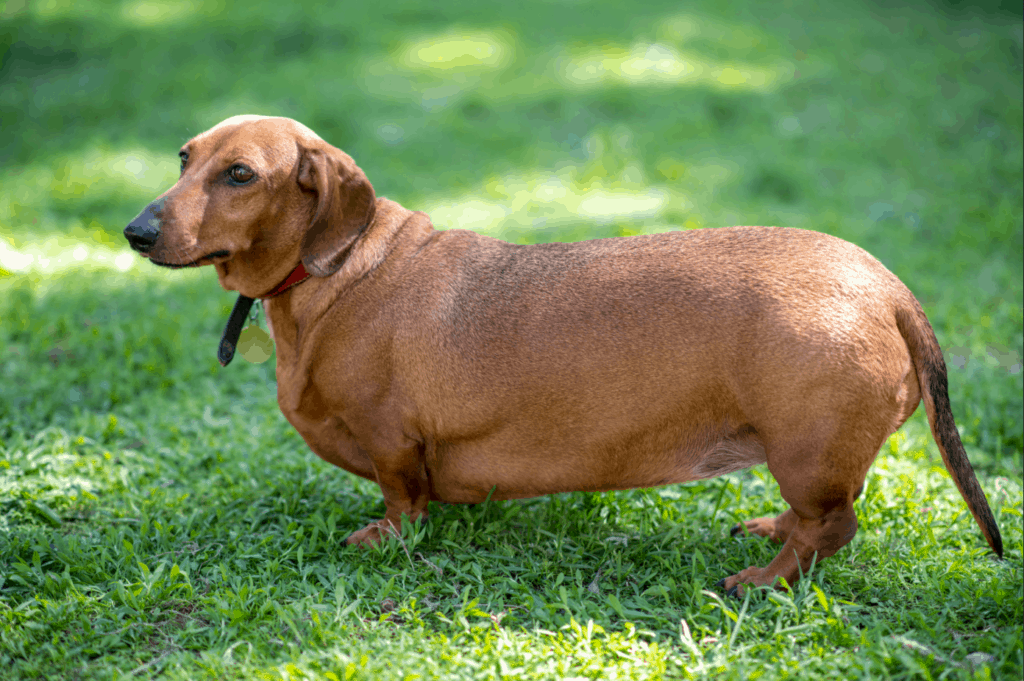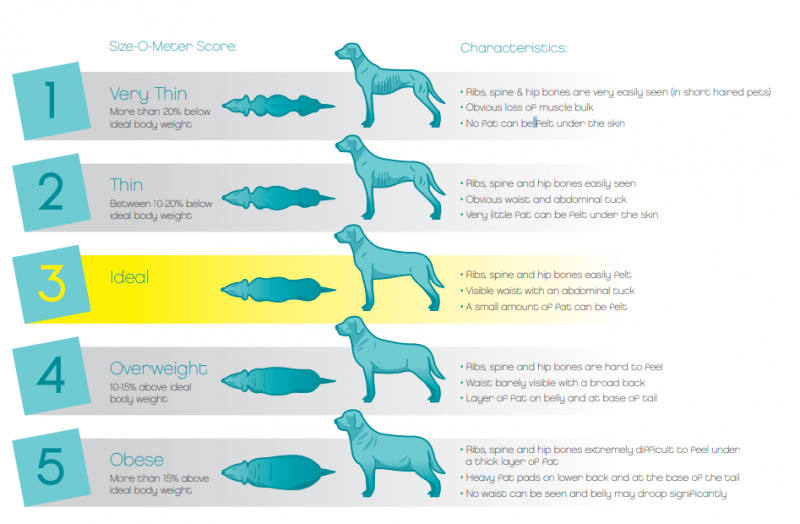
The ideal weight for a Standard dachshund is between 16-32 pounds. Depending on the size a “Tweenie” dachshund should weigh between 11 and 16 pounds. Finally, Miniature dachshunds weigh under 11 pounds.
However, it is essential to note that a healthy dachshund can be slightly above or below these weights as long as they are not obese. It is always best to consult with your veterinarian for specific weight goals for your dog.

How to Determine a Dachshund’s Healthy Body Weight
By paying close attention to your dachshund’s body condition, you can ensure that they maintain their ideal weight and live a long, happy life. As always, be sure to consult with your veterinarian for additional advice on maintaining your pup’s healthy body weight!
To determine if your dachshund is at a healthy weight, you need to watch and feel your dachshund. If it is difficult for them to stand or seem sluggish, they may need to lose weight. If the dachshund has a rounder body shape and you can visibly see fat deposits on its body, then they are overweight.
How to Assess if Your Dachshund is Overweight
Many dachshund owners are unaware of their dog’s weight until they take them to the vet and are told their dog is overweight. However, there are ways to assess your dog’s weight at home.
One way is to feel around the sides of your dog’s body and pinch the skin. A layer of skin and muscle between the ribs is normal, but pet owners should be able to feel rib bones underneath. If you can’t feel the rib bones underneath, then your dog may be overweight.
However, if you can easily feel their rib bones, it might be that your dachshund is underweight and you should consult your veterinarian.
You should also, examine your dachshund’s profile from the side. Overweight dachshunds usually have a low-hanging abdomen rather than a natural curve at the waist. When looking from above, a waistline should be noticeably visible along the torso.
Finally, you can also look at your dog from above. A healthy dog will have a defined waistline when viewed from above. If you notice any of these signs, it may be time to talk to your veterinarian about putting your dog on a diet.

What is overweight for a Dachshund?
A bulging waistline indicates that a dachshund is overweight. If you are unsure whether or not your dog is overweight, consult with your veterinarian. They can perform a physical examination and provide you with guidance on how to help your pet achieve a healthy weight.
Many dogs gain weight gradually, so pet owners who see their dog daily may not notice a pet’s extra bulk. Examining a dachshund’s physique is a good way to determine weight gain without using a scale.
It is important to be aware of your dachshund’s weight and take steps to make sure they are at a healthy weight. Make sure you feed them a balanced diet and get them enough exercise each day. Talk to your veterinarian if you have any questions or concerns about your pup’s body weight. With the right care, your dachshund will stay happy and healthy for many years to come!
An overweight dachshund is prone to many health issues, such as joint pain and difficulty breathing. To keep your pup at a healthy weight, be sure to follow a balanced diet and get daily exercise. Also, monitor your pup’s body condition score regularly to ensure they are not gaining too much or too little weight.
Overall, each dachshund is unique and will have its ideal body weight based on size and activity level. Keeping them within the recommended weight range is important for their health and happiness. If you have any questions, be sure to talk to your veterinarian.
Related post: Why won’t my dachshund lose weight?
The Dangers of Obesity in Dachshunds
If you feel that your dachshund is overweight, talk to your veterinarian about ways to safely reduce their body weight. It may also be helpful to talk with a canine nutritionist or certified canine fitness trainer for advice on diet and exercise plans to help keep your pup at a healthy weight.
Obesity is a growing problem among American pets, and data from the Association for Pet Obesity Prevention shows that over half of all dogs are overweight or obese. This is a serious concern, as obesity can lead to a host of health problems, including diabetes, osteoarthritis, and respiratory issues. For Dachshunds, being overweight can also put unnecessary strain on their backs and spines.
Related post: Is Your Dachshund Overweight?
Final thoughts
By following these guidelines, you can help ensure that your dachshund maintains their ideal weight and enjoys a healthy, happy life.
Note: It is important to talk to your veterinarian before making any changes to diet or exercise routines for your pup. Your veterinarian can provide you with personalized advice and support as you work towards maintaining a healthy body weight for your dachshund. They may also recommend medications or supplements to help maintain a healthy weight.
Also, always feed your dachshund the appropriate amount of food for their size and age, as overeating can lead to obesity. Finally, make sure you are providing daily exercise for your pup – this is essential to keep them at a healthy weight!
Check out our Dachshund Diet and Exercise Guide
Sources and useful links:
- https://www.petcarerx.com/article/how-to-determine-a-dachshunds-ideal-body-weight/306
- https://www.dachshundhealth.org.uk/body-condition-and-weight
- https://www.dachshundhealth.org.uk/welcome/what-s-a-healthy-body-weight-and-condition-for-my-dachshund
- https://www.purina.co.uk/articles/dogs/health/exercise/dog-body-condition-tool
Recent Posts
Calculate the perfect food portions for your dachshund with our specialized calculator. Get customized feeding recommendations based on size, age, and activity level to support your wiener dog's back...
Looking for the perfect gift for a proud dachshund mom? We’ve rounded up the cutest dachshund shirts that celebrate your love for wiener dogs in style. Whether you’re shopping for yourself or a...


